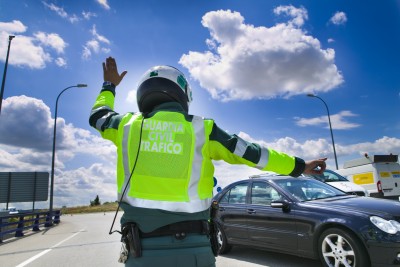Thousands of British tourists travel to Fuerteventura each year and what better way to explore the island than to rent a car to have the means to go where you please? Well, drivers beware you do not commit parking or speeding offences because it can catch up with you.
Every month more than 2,500 Brits are chased by European authorities upon returning from their holiday and private companies investigate an astonishing number of cases each day in an attempt to bring bad drivers to justice.

Mr Stuart Hendry, is the Legal manager of London based company, European Parking Collection (EPC) and he kindly agreed to answer a few questions. EPC collaborates with various European countries including Spain and processes 5000 penalties a day on average according to 2011 statistics.
SLW: What is EPC’s primary function?
SH: It basically replicates what local authorities would do domestically. If a Spanish vehicle was issued a ticket, the competent authority would follow up but with foreign vehicles or drivers, this is not the case so we step in. The information is forwarded to us and we issue the offender with documents in their language and currency. Not every country’s laws allow outsourcing; France and Germany are two examples.
SLW: Where are most infractions incurred?
SH: From my experience, German drivers tend to be the biggest offenders but regarding the volume of penalties incurred, I would say that the UK and Norway are the biggest offenders.
SLW: What requirements are necessary to gain access to DVLA’s database due to Data Protection restrictions and is this information available to you instantaneously?
SH: A registered company must have reasonable cause to request data and ensure data protection safeguards are in place before any data is released. If a UK registered vehicle is involved in an infraction in a foreign country, there is reasonable cause to issue data and the same for Spanish vehicles in the UK due to reciprocity between the two countries. Requests are not instantaneous. The process takes approximately two days where information is crosschecked.
SLW: How efficient is your system?
SH: We have achieved a 40%-50% success rate without the need for additional legal enforcement even though the council may take further action if the fine is not paid after our initial notification.
SLW: It is implied that the DVLA profits from these collaborations. They receive £2,50 per case, approximately £75,000 revenue per year. Is this exact?
SH: The DVLA does charge this per case file but they are not “selling” personal data, it is a process fee. Each country has its own system. In Spain for example, it isn’t a process fee but a tax of 80€ per case.
So, there you have it, you have been warned. There are stricter policies within Europe to track down traffic offenders so whilst on holiday, take a little bit of extra care otherwise your stay in the sun could cost you more than you bargained for.


